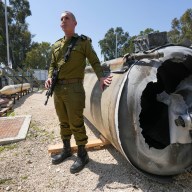By Josh Smith
SEOUL (Reuters) – A senior United Nations human rights official on Thursday said he was investigating North Korea’s allegations that a dozen restaurant workers who arrived in the South from China last year were abducted against their will.
Tomas Ojea Quintana, the U.N. special rapporteur on human rights in North Korea, said he spent part of a four-day visit to Seoul looking into the claims surrounding the biggest mass defection case involving North Koreans in several years.
“I have received testimony taken by people in my office that shows inconsistencies in what may have happened,” Quintana told a news briefing.
North Korea says the 12 waitresses were abducted, and a manager who defected with them tricked them into making the journey. It has demanded the return of the women, but officials in Seoul say they traveled voluntarily and were admitted on humanitarian grounds.
Some of the workers are now university students, according to several sources who have met them, but all have kept a low profile and mystery still surrounds their trip.
Relatives in the North had also raised objections, Quintana added.
“I was told the father of one of these women recently passed away without meeting his daughter, adding to a long list of victims who continue to pay the absurd cost of division,” he said.
The briefing was briefly interrupted by Kim Ryon Hui, a woman who said she had been forcibly held in South Korea for seven years.
Quintana said he had met Kim the previous day, but did not have the authority to comment on human rights issues in South Korea.
North Korean officials have said the 12 waitresses and Kim must be allowed to return before they allow family visits to resume.
In an interview with Reuters in November, Kim said she first arrived in the South to seek a better job, without realizing her return home would be blocked by its laws that the government must approve visits to, or contact with, the North.
Allowing Kim’s permanent return would violate the law, says the South’s Ministry of Unification, which estimates 881 defectors to have arrived from the North this year.
Quintana urged that international sanctions imposed on North Korea over its nuclear weapons program be tailored to avoid any adverse impact on human rights and economic livelihoods.
Restrictions on international financial transfers, for example, should not affect U.N. programs that provided humanitarian assistance, he said.
While Pyongyang has condemned the sanctions, Quintana called for the government to “substantiate its criticism with substantive data”, and provide access for international human rights monitors.
Impoverished North Korea and the rich, democratic South have been in a technical state of war since their 1950-53 conflict ended in a truce, not a peace treaty.
A North Korean soldier who defected to the south in November was shot five times by border guards and critically wounded in his desperate dash through the demilitarized zone dividing the two.
(Additional reporting by Haejin Choi and Hyonhee Shin; Editing by Clarence Fernandez)














